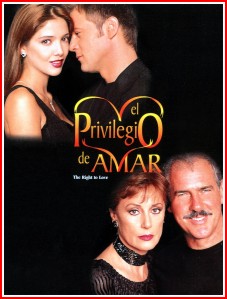Related Research Articles

Mexican literature stands as one of the most prolific and influential within Spanish-language literary traditions, alongside those of Spain and Argentina. This rich and diverse tradition spans centuries, encompassing a wide array of genres, themes, and voices that reflect the complexities of Mexican society and culture. From ancient indigenous myths to contemporary urban narratives, Mexican literature serves as a poignant reflection of the nation's essence, inviting readers to explore its rich history, diverse culture, and collective aspirations.

Heridas de amor is a Mexican telenovela produced by Roberto Hernández Vázquez for Televisa. It is a remake of the telenovela Valeria y Maximiliano. It premiered on April 3, 2006 and ended on September 22, 2006.
The National Prize for Arts and Sciences is awarded annually by the Government of Mexico in six categories. It is part of the Mexican Honours System and was established in 1945. The prize is a gold medal and 520,000 pesos.

El privilegio de amar is a Mexican telenovela produced by Carla Estrada for Televisa. It aired on Canal de las Estrellas from July 27, 1998 to February 26, 1999. El privilegio de amar is a remake of the 1985 Venezuelan telenovela Cristal. El privilegio de amar is the highest-rated television program in Mexico to date; it registered an average of 34.8 percent of TV audience. The telenovela received the TVyNovelas Award for Best Telenovela in 1999.

Niña amada mía is a Mexican telenovela produced by Angelli Nesma Medina for Televisa in 2003. It is an adaptation of the 1985 Venezuelan telenovela Las amazonas.
Morelia is a Mexican telenovela produced by José Enrique Crousillat and Malú Crousillat for Televisa in 1995. Alpha Acosta and Arturo Peniche starred as protagonists, while Cecilia Bolocco starred as the main antagonist.

Camaleones (Chameleons) is a 2009 Mexican telenovela produced by Rosy Ocampo for Televisa. The telenovela aired on Canal de las Estrellas from July 27, 2009 to January 29, 2010. It stars Belinda, Alfonso Herrera, Edith González and Guillermo García Cantú.

Entre el Amor y el Odio is a Mexican telenovela produced by Salvador Mejía Alejandre for Televisa in 2002. It is based on the radionovela Cadena de odio by Hilda Morales de Allouis. It aired on Canal de las Estrellas from Monday, February 11, 2002 to Friday, August 2, 2002.
In Memoriam is the 1977 Spanish directorial debut of Enrique Brasó. The film is based on a story by the Argentine writer, Adolfo Bioy Casares. The film explores the thwarted romance between Julio and Paulina. Brasó collaborated with Chaplin again, as a writer in In the City Without Limits (2002) and Oculto (2005). In Memoriam was released in Spain on 2 September 1977.
Events in the year 1950 in Mexico.
Events in the year 1997 in Mexico.
Bianca Vidal is a Mexican telenovela produced by Valentín Pimstein for Televisa in 1982. Bianca Vidal was based on the soap opera María Salomé, original of Inés Rodena which was then elongated by Sacrificio de mujer from the same author.
The Genius is a 1948 Mexican comedy film directed by Miguel M. Delgado and starring Cantinflas, Perla Aguiar and Carlos Martínez Baena. The film's sets were designed by the art director Gunther Gerszo.

El hotel de los secretos is a Mexican telenovela produced by Roberto Gómez Fernández for Televisa. It is an adaptation of the Spanish series Gran Hotel created by Ramón Campos, Gema R. Neira and Carlos Sedes.
Confidente de secundaria, is a Mexican telenovela produced by Luis de Llano Macedo for Televisa and broadcast in 1996 by Canal de las Estrellas.
María José is a Mexican telenovela produced by Juan Osorio for Televisa in 1995.
Mi querida Isabel is a Mexican telenovela produced by Angelli Nesma Medina for Televisa. This telenovela is a remake of the 1975 Mexican telenovela Paloma, original story by Marissa Garrido. It premiered on Canal de las Estrellas on December 9, 1996 and ended on April 25, 1997.
Midnight is a 1949 Mexican crime film directed by Tito Davison and starring Arturo de Córdova, Elsa Aguirre and Marga López.
Puss Without Boots is a 1957 Mexican comedy film directed by Fernando Cortés and starring Germán Valdés, Martha Valdés and Nono Arsu.
References
- ↑ escritores.cinemexicano.unam.mx: Julio Castillo Margain Archived July 22, 2011, at the Wayback Machine (in Spanish)
- ↑ Conaculta.gob.mx: Castillo (in Spanish)